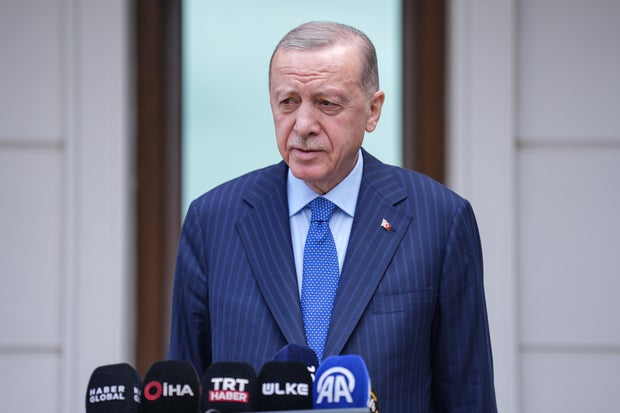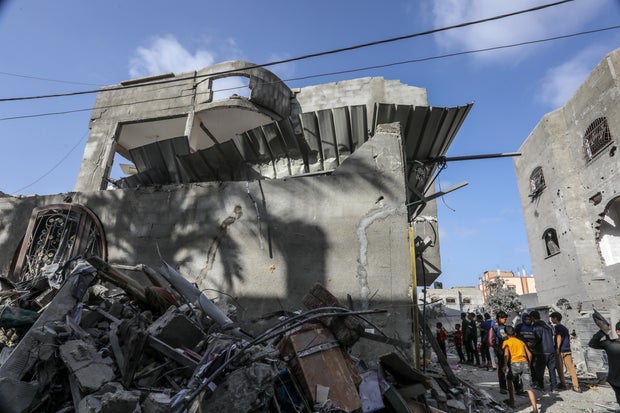Istanbul — Turkish President Recep Tayyip Erdogan said his country imposed a trade ban on Israel because it could no longer “stand by and watch” the violence in Gaza. Turkey announced Thursday that it has suspended all imports and exports to Israel due to its military actions in the war against Hamas rulers in Gaza.
Ankara said on Friday the ban would remain in place until a permanent change the ceasefire is reached and the Israeli government allows all humanitarian aid to reach Gaza unhindered.
“So far, Israel has killed between 40,000 and 45,000 Palestinians without mercy. As Muslims, we could not stand by and watch,” Erdogan told reporters after traditional Friday prayers in Istanbul, suggesting an even higher death toll than than that of Hamas health authorities. Palestinian territory have reported since the war broke out. It was triggered by the Hamas terrorist attack on October 7 against Israel, which left around 1,200 people dead and around 240 others taken hostage by the militants.
Gaza’s Health Ministry said on Friday that 26 more people had been killed by Israeli strikes in the past 24 hours, bringing the total Palestinian death toll in the Israel-Hamas war to at least 34,622. The ministry in Gaza – a densely populated Palestinian territory administered for nearly two decades by Hamas, does not distinguish between civilian and combatant casualties in its counts, but has long said that women and children make up the majority of those killed.
The Israeli military claims to have killed 13,000 Palestinian militants in its war, but has provided no evidence to support the claim. The Israel Defense Forces and Israeli Prime Minister Benjamin Netanyahu have repeatedly insisted that all possible measures be taken to prevent civilian deaths and accuse Hamas of using civilians as human shields, but the UN said this week that the level destruction of civilian housing in Gaza has not been seen since World War II.
The Turkish leader faced intense pressure to halt trade with Israel amid the rising number of civilian deaths in Gaza, and his party lost some votes in March local elections to a small Islamist party that was critical of Turkey’s continued trade relations with the state. Jewish.
“We had a trade volume that reached $9.5 billion between us,” Ergodan said Friday of Israel, “but we closed the door as if that trade volume did not exist.”
Cemal Yurtas/Anadolu/Getty
Erdogan once again held the United States and other Western nations responsible for deaths in the Israel-Hamas war.
“The entire West, and especially America, is working for Israel, mobilizing all resources, and unfortunately, the poor people of Palestine were sentenced to death through Israel’s bombings,” he said.
UN says offensive in Rafah would mean “imminent risk of death” for thousands of people
The United Nations aid agency said on Friday, however, that hundreds of thousands of people would be “at imminent risk of death” if Israel carries out a military strike on the southern Gaza city of Rafah, as it has promised to do.
Jens Laerke, spokesman for the United Nations Office for the Coordination of Humanitarian Affairs, said Rafah has become a crucial hub for distributing humanitarian aid in and around Gaza since Israel launched its attack on Hamas.
Situated right on Gaza’s southern border with Egypt, Rafah is critical to providing food, water, health, sanitation, hygiene and other essential support to people across the Palestinian territory, including hundreds of thousands of Gazans who have fled to Rafah to escape fighting elsewhere.
Abed Rahim Khatib/Anadolu/Getty
Laerke told reporters at a regular UN briefing in Geneva that the displaced masses in the city “would be at imminent risk of death if there were an attack”.
World Health Organization officials said they were preparing contingency plans for a possible attack in Rafah. They noted, however, that more food has reached besieged Palestinians in recent weeks, but the threat of famine remains.
Dr. Rik Peeperkorn, WHO representative for the occupied Palestinian areas, said via video conference that the threat of famine had “absolutely not” diminished. Dr. Ahmed Dahir, head of the WHO office in Gaza, said the food situation was fragile and that “the risk of famine has not passed.”

























